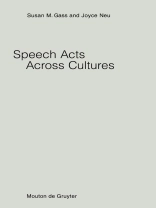This book investigates the notion of Speech Act from a cross-cultural perspective. The starting point for this book is the assumption that speech acts are realized from culture to culture in different ways and that these differences may result in communication difficulties that range from the humorous to the serious. Importantly, a recurring theme in this volume has to do with the need to verify the form, the function and the constraining variables of speech acts as a prerequisite for dealing with them in the classroom.
The book deals with three major areas of Speech Act research: 1) Methodological Issues, 2) Speech Acts in a second language, and 3) Applications. In the first section authors discuss general issues of methodology and present data in an effort to detail the efficacy of different methodologies. Research clearly shows the effect of methodology on the results. This section is followed by a discussion of specific speech acts, including speech acts and strategy use that have as their goal the creation and maintenace of solidarity (i.e. greetings, compliments, apologies) and speech acts that involve face-threatening acts (i.e.complaints, favor-asking, suggestions). In the final section, authors consider applications of speech act research within the context of advertising and business relationships.
About the author
Susan M. Gass, Michigan State University, USA; Joyce Neu, University of San Diego, USA.












